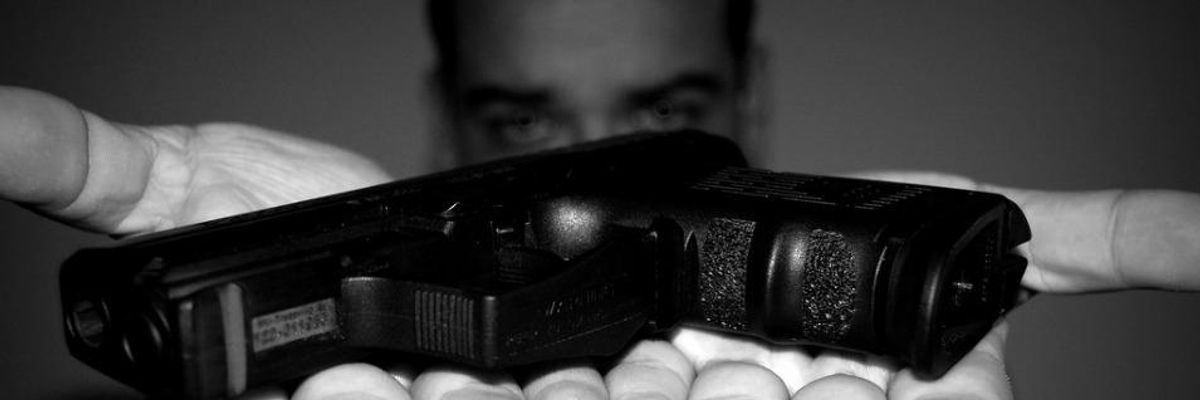The "gun debate" is the national schism that seemingly cannot be bridged. Those on one side see the loosely regulated presence of 300 million firearms in this country as a threat to everyone's safety and gasp in ongoing disbelief when the gun lobby smirks that the solution to every mass killing is . . . more guns for the good guys. Arm the teachers!
The obvious conclusion is that the NRA is the incredibly effective public relations arm of the gun industry. It spends hundreds of millions of dollars purchasing politicians in sufficient quantity to keep America free of gun laws, in defiance of the will of the majority of Americans.
But on the other side of this seething paradox are the gun owners, many of whom see gun regulation, among other things, as a bureaucratic limitation on their right to live in safety. David French put it with stark clarity in a recent essay in the National Review:
". . . the individual decision to purchase and carry a gun isn't rooted in some sort of strange gun fetish or Wild West swagger but rather in the fundamental desire (and right) to protect your loved ones from harm. If arguments for gun control don't grapple with this reality, then they're destined to fail."
"A movement focused on what is essentially nothing more than a bureaucratic fix is probably dead in the water. Gun control may be necessary, but what kind of passion can it generate?"
Gun control proponents, which he refers to, inaccurately, as the Left, "keeps losing on guns," he goes on. "It simply can't persuade a rational, reasonable adult who's experienced a threat that they're safer without effective means of self-defense. Indeed, the effort to make this case is so often rooted in condescension or ignorance that it's deeply alienating."
I disagree with much of what French had to say in his essay -- there was no indication, for instance, that he was willing to concede the least need for firearms regulation (good guys need semiautomatics to defend themselves against bad guys with semiautomatics), or the least possibility that personal safety can be achieved by other means -- but I see his basic point: If you don't feel safe unless you're armed, those who apparently want to limit your safety are the enemy.
There's also another way to put it. A movement focused on what is essentially nothing more than a bureaucratic fix is probably dead in the water. Gun control may be necessary, but what kind of passion can it generate?
But of course there is passion around this issue -- the passion of parents who have lost their children to gun violence, the passion of teenagers who are standing up for their own safety, crying "Enough is enough!" That passion has generated a corporate if not a political response, with businesses severing their ties with the NRA and both the Walmart's and Dick's Sporting Goods chains upping the minimum age to purchase guns at their stores to 21. Dick's will also stop selling assault-style weapons, which Walmart's had stopped doing three years ago.
Uh, OK. Great. These are small steps in a long struggle. But something is missing here. The Republican pols are hanging tough, refusing to give an inch on gun-control legislation, and the guns-protect-life crowd, backed by lots of money, are pushing back with diabolical legislative ideas such as requiring that teachers be armed. Even if ideas this insane have no chance of becoming law (or do they?), they succeed at changing the focus of the debate: It's not laws that keeps us safe, it's guns that keep us safe. If you don't like it, move to Australia.
And the schism festers.
And nothing is changing. Another mass murder will hit the headlines one of these days, more likely sooner rather than later. Miniscule legislative changes are unlikely to deal in any way with the ability of would-be killers to obtain the firepower they crave. And of course the country's gargantuan military budget and multiplying international quagmires will just keep growing and growing, dominating the nation's spending and hastening our social collapse.
Something's gotta give. The national stalemate on guns will not end with one side's victory and the other side's defeat. It will only be resolved when the paradox of the divide is itself resolved, or transcended.
I return to David French and "the fundamental desire (and right) to protect your loved ones from harm" that he writes about. This is no different from the passionate cries for safety and protection emerging from the students at Stoneman Douglas High School and every other school across the country. Their protection is not a matter of metal detectors or lockdown drills -- or miniscule legal fixes. They are crying that violence is not a game, to be wielded recklessly to create temporary safety.
Both sides are crying out for empowerment -- not temporary, not bureaucratically controlled, but basic, fundamental, profound. Both sides are crying: Our lives are sacred!
Indeed, all lives are sacred. No one should be dehumanized. I believe the only resolution to the "gun debate" is an agreement that we set about creating a social order with that belief at its foundation.
We will still face danger, but the time has come to realize, and collectively acknowledge, that facing danger nonviolently -- with courage and presence of mind, but unarmed -- is not only possible but highly effective.
I have written about this in the past, and have used my column as a forum for people's stories about unarmed empowerment. I believe it is time to do so again. How have you faced and averted a dangerous situation by standing up to it unarmed? Such stories need to be told, again and again and again. Each one is unique. Each one can interrupt the national obsession with violence . . . and violent solutions that always come back to haunt us.

